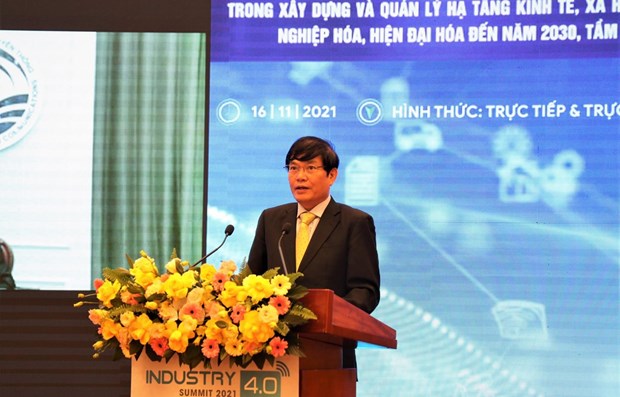Efforts required to enhance resilience against digital economy’s ‘shocks’
 Deputy head of the Party Central Committee’s Economic Commission Do Ngoc An speaks at the workshop on digital infrastructure development and digital technology-platform application in socio-economic development building and management during industrialisation and modernisation to 2030, vision to 2045 (Photo: VietnamPlus)
Deputy head of the Party Central Committee’s Economic Commission Do Ngoc An speaks at the workshop on digital infrastructure development and digital technology-platform application in socio-economic development building and management during industrialisation and modernisation to 2030, vision to 2045 (Photo: VietnamPlus)Hanoi (VNA) – The community is facing severe impacts of the COVID-19 pandemic, and to enhance resilience against ‘shocks,’ new solutions are required to address new challenges.
Weaknesses in socio-economic infrastructure pose major obstacles to the economy’s development, especially against the backdrop of COVID-19. This requires Vietnam to try to effectively capitalise on opportunities brought by the Fourth Industrial Revolution.
The acceleration of growth model shift and economic restructure is deemed necessary in combination with the implementation of strategic breakthroughs as well as industrialisation and modernisation, particularly digital infrastructure development and the application of digital technology-platforms based on science-technology, innovation and high quality human resources.
Slow and passive
At a workshop on digital infrastructure development and digital technology-platform application in socio-economic development building and management during industrialisation and modernisation to 2030, vision to 2045, vice head of the Party Central Committee’s Economic Commission Do Ngoc An underlined that the building of e-Government towards digital Government has been stepped up and has reaped positive results.
However, amid the global trend in industrial development and modernisation along with risks and challenges triggered by external ‘shocks,’ he stated that drawbacks remain in Vietnam’s infrastructure system.
 An overview of the workshop (Photo: VietnamPlus)
An overview of the workshop (Photo: VietnamPlus)An said that the slow speed of telecommunication-information technology infrastructure has yet to meet requirements for the development of Internet of Things, smart cities, autonomous vehicles and smart production, among others. Besides, broadband access in the rural and mountainous areas is still limited.
In addition, domestic infrastructure failed to apply smart management methods and the national database implementation was sluggish. This has resulted in a scattered national database for the digital economy and asynchronous infrastructure for digital payment. The shortage of electricity serving the telecom system has hampered progress.
Those factors slowed down the national digital transformation and made businesses become passive in modern technology access and development, the official added.
Faults in infrastructure planning in Vietnam, low quality planning, lack of consistency, connections and long-term vision were reasons for the downsides. Thus, frequent adjustments are needed.
Adapting to new situation
Asian Development Bank (ADB) Country Director for Vietnam Andrew Jeffries pointed out that a strategic use of digital technology is key to Vietnam’s long-term economic recovery.
As the community and businesses are struggling against COVID-19, health care and economic issues received a major blow.
Therefore, new solutions to new challenges are needed in order to enhance resilience against ‘new shocks,’ he affirmed.
On the other hand, the pandemic has recently sped up digital transformation. Negative impacts on socio-economic activities have been reduced and a foundation for long-term economic recovery has been created.
Vietnam should take advantage of the opportunity to promote digital transformation in firms and Government agencies and obtain benefits of the process. Failure to do so may affect the country’s competitive edge and growth in the future, hindering the realisation of important national goals, such as being a key member in the global supply chain, Jeffries warned.
For his part, Phan Hong Tam, Director of Cloud Infrastructure of FPT Smart Cloud, shared a success story in the optimal operation of hundreds of minimarts in Vietnam.
Convenient store owners faced challenges in Vietnam as information exchange encountered disruptions, troubling the building of a management system on the international cloud platform.
To fix the problem, FPT Cloud moved the system, optimised transmission lines and rolled out security measures to ensure safety for the system. This, along with high data storage capacity and preparedness, has enabled payment activities of stores to be flexible with a secured infrastructure that meets international standards.
Pham Anh Duc, an expert from Viettel Military Industry and Telecoms Group, delivered an initiative to bolster digital transformation infrastructure in Vietnam with numerous pillars, namely building a data centre based on cloud computing and digital infrastructure investment, with priority given to domestic digital infrastructure application.
The building of a national digital infrastructure strategy to complete national standards has a significant role to play, he stressed./.













